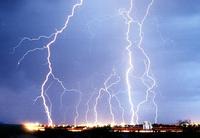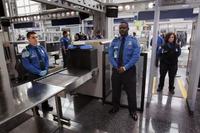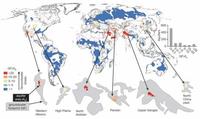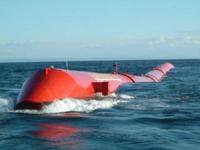-
DARPA Young Faculty meet next generation of Army tech users
Recipients of the DARPA Young Faculty Award (YFA) visited the United States Military Academy at West Point during its first Branch Week, 10-15 September 2013. The event brought “several hundred tons of military equipment, vehicles and weapons for the academy’s spin on a college career fair,” one observer said.
-
-
U.S. to face an increased risk of severe thunderstorms

Severe thunderstorms, often exhibiting destructive rainfall, hail and tornadoes, are one of the primary causes of catastrophic losses in the United States. In 2012, eleven weather disasters in the United States crossed the billion-dollar threshold in economic losses. Seven of those events were related to severe thunderstorms. New climate analyses indicate that global warming is likely to cause a robust increase in the conditions that produce these types of storms across much of the country over the next century.
-
-
Calculating emissions, costs of increased wind, solar in the West
New research quantifies the potential impacts of increasing wind and solar power generation on the operators of fossil-fueled power plants in the West. To accommodate higher amounts of wind and solar power on the electric grid, utilities must ramp down and ramp up or stop and start conventional generators more frequently to provide reliable power for their customers — a practice called cycling.
-
-
DHS finds no racial profiling at Logan Airport

An August 2012 allegation of racial profiling by Transportation Security Administration (TSA) officers sparked an investigation into the screening practices of TSA officers at Logan International Airport. DHS has recently concluded an investigation into allegations, and concluded that there was no evidence that TSA officers in Boston have been targeting minorities for additional screening to meet quotas.
-
-
ASIS releases updated, expanded edition of “Career Opportunities in Security”
ASIS International (ASIS) announced the publication of the updated and expanded new edition of Career Opportunities in Security. The 36-page booklet provides information of interest to those seeking to learn more about security, and serves as a resource to those considering a career in security management, or wanting to further their existing careers in the industry.
-
-
Conference marks opening of UMass Lowell’s new Center for Terrorism and Security Studies
Top counterterrorism and law enforcement officials and leading researchers are today (Tuesday) gathering at UMass Lowell to discuss the challenges they face in protecting the public and their work to find solutions to security threats. The event marks the opening of UMass Lowell’s new Center for Terrorism and Security Studies.
-
-
“In 30 years Iran will be a ghost town” if the country’s water situation does not improve

Issa Kalantari, a former agriculture minister during the presidency of Ayatollah Hashemi Rafsanjani and currently and advisor to President Hassan Rouhani’s cabinet, says Iran’s water crisis was especially grave. “Our main problem that threatens us, that is more dangerous than Israel, America or political fighting, is the issue of living in Iran. It is that the Iranian plateau is becoming uninhabitable”; “If this situation is not reformed, in 30 years Iran will be a ghost town.”
-
-
ASIS Foundation contributes to Chicago Public School’s security enhancements
On Friday, 20 September, the ASIS Foundation presented Spencer Technology Academy, in the Chicago Public Schools (CPS), a donation of $42,450 for security improvements. Spencer Technology Academy is the winner of the ASIS Foundation’s School Security Funding Competition. Through a series of short essays, schools in CPS were asked to consider their particular security concerns and what risks they would attempt to reduce or eliminate, along with a list of specific security enhancements they would purchase with the funding.
-
-
Missed opportunities to save water, energy
Water and wastewater managers are missing substantial opportunities to save energy and money, according to a new report.The report also identifies significant gaps in knowledge about the amount of water used to extract energy resources such as natural gas, oil, and coal, and to generate electricity.
-
-
Teams show robust radio techniques at Spectrum Challenge event

Radios are used for a wide range of tasks, from the most mundane to the most critical of communications, from garage door openers to first responders to military operations. Wireless devices often inadvertently interfere with and disrupt radio communications, and in battlefield environments adversaries may intentionally jam friendly communications. To stimulate the development of radio techniques that can overcome these impediments, the agency launched its Spectrum Challenge — a competitive demonstration of robust radio technologies that seek to communicate reliably in congested and contested electromagnetic environments without direct coordination or spectrum preplanning.
-
-
Congress urged to support broad legislative agenda for science
With the U.S. Senate poised to revisit S. 1392, the Energy Savings and Industrial Competitiveness Act of 2013, the American Chemical Society (ACS) announced its support for the bill as part of a larger, legislative science agenda for 2013.
-
-
Flood insurance is not available to Canadian homeowners – should it be?
Canada is the only G8 country in which insurance against overland flooding is not available to homeowners — but does it have to remain that way? A study released Monday explores issues related to flooding and property insurance, aiming to advance informed discussion of the potential better to protect Canadian homeowners. It reveals that while insurance executives are concerned about the lack of flood insurance and agree on many of the associated issues, opinions remain mixed concerning its viability in Canada.
-
-
Microbial power storage can do the job
Oil and gas can be converted into electricity in line with demand, but wind, water, and sun cannot be adapted as readily to fluctuations in power consumption. Efficient power storage solutions must satisfy two essential criteria: Their own consumption of resources must be as low as possible, and surplus power must be stored within seconds. The results of a pilot study have now demonstrated that a microorganism-based process developed by is unequalled in the way it satisfies both of these criteria.
-
-
Smartphone “microscope” can detect a single virus, nanoparticles

Your smartphone now can see what the naked eye cannot: A single virus and bits of material less than one-thousandth of the width of a human hair. Researchers have created a portable smartphone attachment that can be used to perform sophisticated field testing to detect viruses and bacteria without the need for bulky and expensive microscopes and lab equipment. The device weighs less than half a pound.
-
-
Extracting maximum energy from currents

In the long sprint to find new sources of clean, low-cost power, slow and steady may win the race — the slow-moving water of currents and tides, that is. Just as wind turbines tap into the energy of flowing air to generate electricity, hydrokinetic devices produce power from moving masses of water.
-
More headlines
The long view
Autonomous Vehicle Technology Vulnerable to Road Object Spoofing and Vanishing Attacks
Researchers have demonstrated the potentially hazardous vulnerabilities associated with the technology called LiDAR, or Light Detection and Ranging, many autonomous vehicles use to navigate streets, roads and highways. The researchers have shown how to use lasers to fool LiDAR into “seeing” objects that are not present and missing those that are – deficiencies that can cause unwarranted and unsafe braking or collisions.
Tantalizing Method to Study Cyberdeterrence
Tantalus is unlike most war games because it is experimental instead of experiential — the immersive game differs by overlapping scientific rigor and quantitative assessment methods with the experimental sciences, and experimental war gaming provides insightful data for real-world cyberattacks.
Prototype Self-Service Screening System Unveiled
TSA and DHS S&T unveiled a prototype checkpoint technology, the self-service screening system, at Harry Reid International Airport (LAS) in Las Vegas, NV. The aim is to provide a near self-sufficient passenger screening process while enabling passengers to directly receive on-person alarm information and allow for the passenger self-resolution of those alarms.
Falling Space Debris: How High Is the Risk I'll Get Hit?
An International Space Station battery fell back to Earth and, luckily, splashed down harmlessly in the Atlantic. Should we have worried? Space debris reenters our atmosphere every week.
Testing Cutting-Edge Counter-Drone Technology
Drones have many positive applications, bad actors can use them for nefarious purposes. Two recent field demonstrations brought government, academia, and industry together to evaluate innovative counter-unmanned aircraft systems.
Strengthening the Grid’s ‘Backbone’ with Hydropower
Argonne-led studies investigate how hydropower could help add more clean energy to the grid, how it generates value as grids add more renewable energy, and how liner technology can improve hydropower efficiency.
